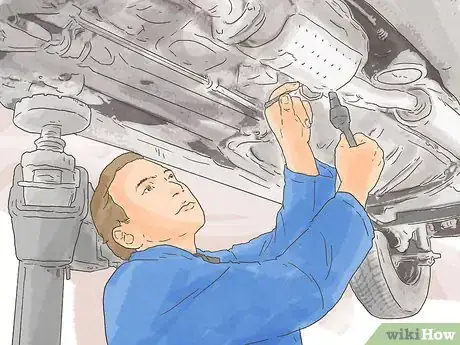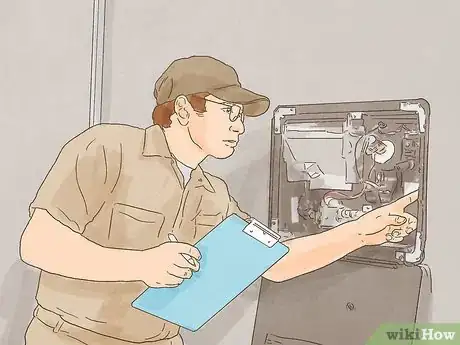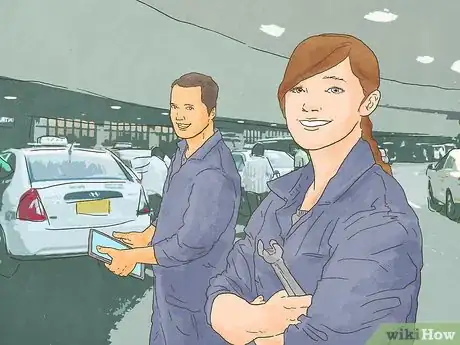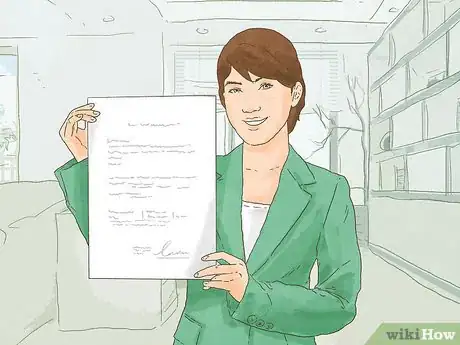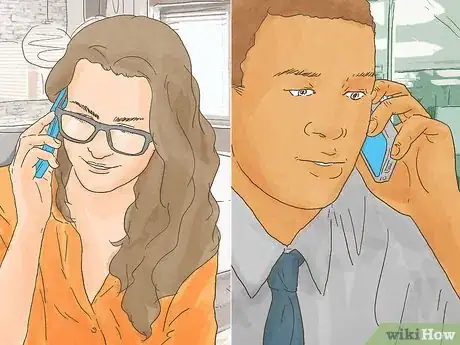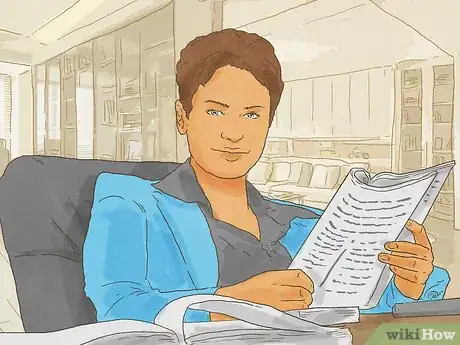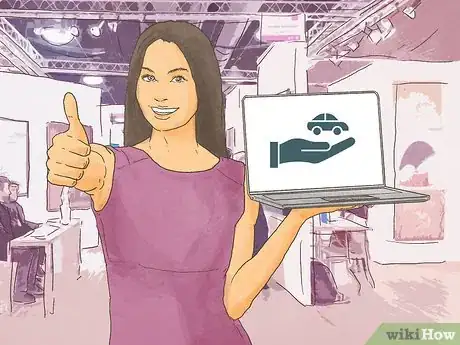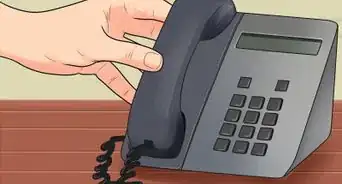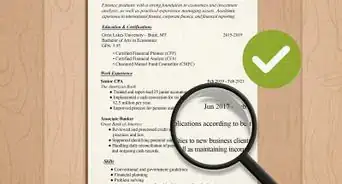This article was co-authored by wikiHow Staff. Our trained team of editors and researchers validate articles for accuracy and comprehensiveness. wikiHow's Content Management Team carefully monitors the work from our editorial staff to ensure that each article is backed by trusted research and meets our high quality standards.
There are 9 references cited in this article, which can be found at the bottom of the page.
This article has been viewed 78,278 times.
Learn more...
An auto insurance adjuster is an important link between an insurance company and a claimant who has suffered an accident. As an auto insurance adjuster, you would investigate and review evidence in order to decide how much the company should pay. Work as an adjuster uses analytic, communication, math, and interpersonal skills to help others during what can be a traumatic time. Entering this career path requires experience, licensing, and decisions about paths to employment.[1] .
Steps
Gaining Experience
-
1Get a high school diploma GED. This level of education is the minimum requirement for many entry-level adjuster positions. If you choose to not continue to a post-secondary degree, some vocational schools and community colleges offer classes you can take to learn more about auto body repair. This advanced training can make you a more competitive candidate for entry-level positions as a high school graduate.[2]
-
2Earn a post-secondary degree. Most companies prefer candidates with a bachelor’s degree, advanced vocational training, or insurance industry work experience where the candidate has learned how to estimate the cost of repairing various types of damage. Appropriate areas of study and experience include:[3]
- accounting courses
- business courses
- employment in an auto repair shop
Advertisement -
3Choose which type of auto insurance adjustment work you’d like to do. Staff adjusters are employed full-time at insurance companies, while independent adjusters are contractors who work for one or several insurance companies.[4] The setting and terms of your future employment will determine your day-to-day experiences, schedule, and flexibility as an auto insurance adjuster.[5]
-
4Find a mentor. Ask an experienced auto insurance adjuster if you can work under them as a trainee to learn the trade. Under their mentorship, you will begin with small claims and progress to more complex claims as you gain experience and prepare to work on your own.[6]
Getting a License
-
1Determine licensing requirements for the state where you want to practice. Every state has its own requirements for licensing. Your state’s information will be on the state’s Department of Insurance website. This information will include details such as:[7]
- minimum age
- qualifications
- residency requirements
- states with reciprocal licensing agreements
- experience requirements
- education requirements
-
2Complete pre-licensing classes. Some states will not require pre-licensing classes. For those that do, classes may be offered online or in a classroom setting. You may have to pay a fee for the classes. The classes will cover such topics as:[8]
- insurance regulation
- insurance basics
- automobile insurance
- adjusting losses
-
3Take the licensing exam. Some states will not require an exam. For those that do, the state’s Department of Insurance website may have study material available as well as the information you need to prepare. You may have to pay a fee to sit the exam. The exam will cover knowledge on such topics as:[9]
- personal automobile insurance coverage
- state laws relevant to working as an adjuster
- adjusting losses
- fair claims settlement practices
-
4Complete the license application process. After passing the exam, you may still need to complete some steps to apply for the license itself, including submitting your pre-licensing class certificate and other forms to the state Department of Insurance, completing fingerprinting, undergoing a background check, and paying a license application fee.[10] Your state’s Department of Insurance website will detail how to complete the application process and receive your license.
Obtaining Employment
-
1Contact insurance companies. The websites and HR departments of these companies should be able to provide information about open staff and independent contractor adjustor positions.[11]
-
2Tailor your resume and cover letter to the auto insurance adjuster industry. Include information about your relevant education, experience, training, and licensing.[12]
-
3Apply for staff adjuster positions. Once you find a position that interests you with a company you would like to work for, check their requirements to confirm you fulfill them, and then submit your resume and cover letter.
-
4Brand yourself if you’ve chosen to be an independent contractor. You will need to showcase your background and skills as you present your services to multiple insurance companies. Plan to:[13]
- Create a website that presents you as a skilled, licensed, personable, and professional independent auto insurance adjuster
- Design or commission a logo that makes you and your services recognizable and memorable
- Produce marketing materials such as business cards and stationery
- Put forth a brand message and promise, and then deliver on your promise. This will build your reputation and lead to more work
Community Q&A
-
QuestionI have 25-plus years of collision repairs experience. What do I need to become an auto insurance adjuster?
 Community AnswerYou have a big head start by having this experience. Did you work on the line? Obviously you must be I-CAR and ASE certified, but do you have estimating experience? You must be computer literate. You need to have outstanding communication skills - not social media but real interpersonal face to face and writing skills. You will be writing reports and using email all of the time. Gone are the days where secretaries handle clerical work - you are now a secretary, file clerk, paralegal, estimator, and avid investigator. Continued education is mandatory. Look for entry level jobs at companies in your area, visit their websites for employment postings.
Community AnswerYou have a big head start by having this experience. Did you work on the line? Obviously you must be I-CAR and ASE certified, but do you have estimating experience? You must be computer literate. You need to have outstanding communication skills - not social media but real interpersonal face to face and writing skills. You will be writing reports and using email all of the time. Gone are the days where secretaries handle clerical work - you are now a secretary, file clerk, paralegal, estimator, and avid investigator. Continued education is mandatory. Look for entry level jobs at companies in your area, visit their websites for employment postings. -
QuestionWhere is the school to get certification?
 Community AnswerThis depends on what state you are in, and if you want to be a licensed adjuster, or an estimator. Many states require you to have already worked in the automotive industry for a certain period of time before you are eligible to take the test and apply for a license. If you have a felony or even some misdemeanors many states will not grant you a license, and background checks are required now. Educate yourself on the difference between an adjuster and an estimator. Then you can decide which, if not both, best suits your personality. Then proceed with proper avenues in your state for getting experience and certification.
Community AnswerThis depends on what state you are in, and if you want to be a licensed adjuster, or an estimator. Many states require you to have already worked in the automotive industry for a certain period of time before you are eligible to take the test and apply for a license. If you have a felony or even some misdemeanors many states will not grant you a license, and background checks are required now. Educate yourself on the difference between an adjuster and an estimator. Then you can decide which, if not both, best suits your personality. Then proceed with proper avenues in your state for getting experience and certification. -
QuestionWhat type of income can I expect if I become an auto insurance adjuster?
 Community AnswerEntry level starts anywhere from $28K-32K. With automotive repair background you may get $35-40K. Insurance companies, like many corporations, offer what they refer to as a "total rewards/benefit package" that may include things like health insurance, 401ks, tuition reimbursement plans, etc.
Community AnswerEntry level starts anywhere from $28K-32K. With automotive repair background you may get $35-40K. Insurance companies, like many corporations, offer what they refer to as a "total rewards/benefit package" that may include things like health insurance, 401ks, tuition reimbursement plans, etc.
References
- ↑ http://www.bls.gov/ooh/business-and-financial/claims-adjusters-appraisers-examiners-and-investigators.htm#tab-4
- ↑ http://www.bls.gov/ooh/business-and-financial/claims-adjusters-appraisers-examiners-and-investigators.htm
- ↑ http://www.bls.gov/ooh/business-and-financial/claims-adjusters-appraisers-examiners-and-investigators.htm#tab-4
- ↑ http://www.adjusterpro.com/insurance-adjuster-career/how-to-become-an-insurance-adjuster.html
- ↑ http://www.bls.gov/ooh/business-and-financial/claims-adjusters-appraisers-examiners-and-investigators.htm
- ↑ http://www.bls.gov/ooh/business-and-financial/claims-adjusters-appraisers-examiners-and-investigators.htm#tab-4
- ↑ http://www.insurance.ca.gov/0200-industry/0050-renew-license/0200-requirements/insurance-adjuster.cfm
- ↑ http://www.psionline.com/PROGRAMS/miins/Ind%20Adj%20Work%20Comp%2016-72.pdf
- ↑ http://www.insurance.ca.gov/0200-industry/0030-seek-pre-lic/0100-requirements/upload/ExamObjectivesAJ.pdf
- ↑ http://www.aldoi.gov/licensing/adjusterreq.aspx
- ↑ http://www.adjusterpro.com/insurance-adjuster-career/how-to-become-an-insurance-adjuster.html
- ↑ http://www.adjusterpro.com/insurance-adjuster-career/how-to-become-an-insurance-adjuster.html
- ↑ https://www.entrepreneur.com/article/77408
- ↑ http://www.bls.gov/ooh/business-and-financial/claims-adjusters-appraisers-examiners-and-investigators.htm#tab-4
- ↑ http://www.bls.gov/ooh/business-and-financial/claims-adjusters-appraisers-examiners-and-investigators.htm#tab-4
- ↑ http://www.insurance.ca.gov/0200-industry/0050-renew-license/0200-requirements/insurance-adjuster.cfm

